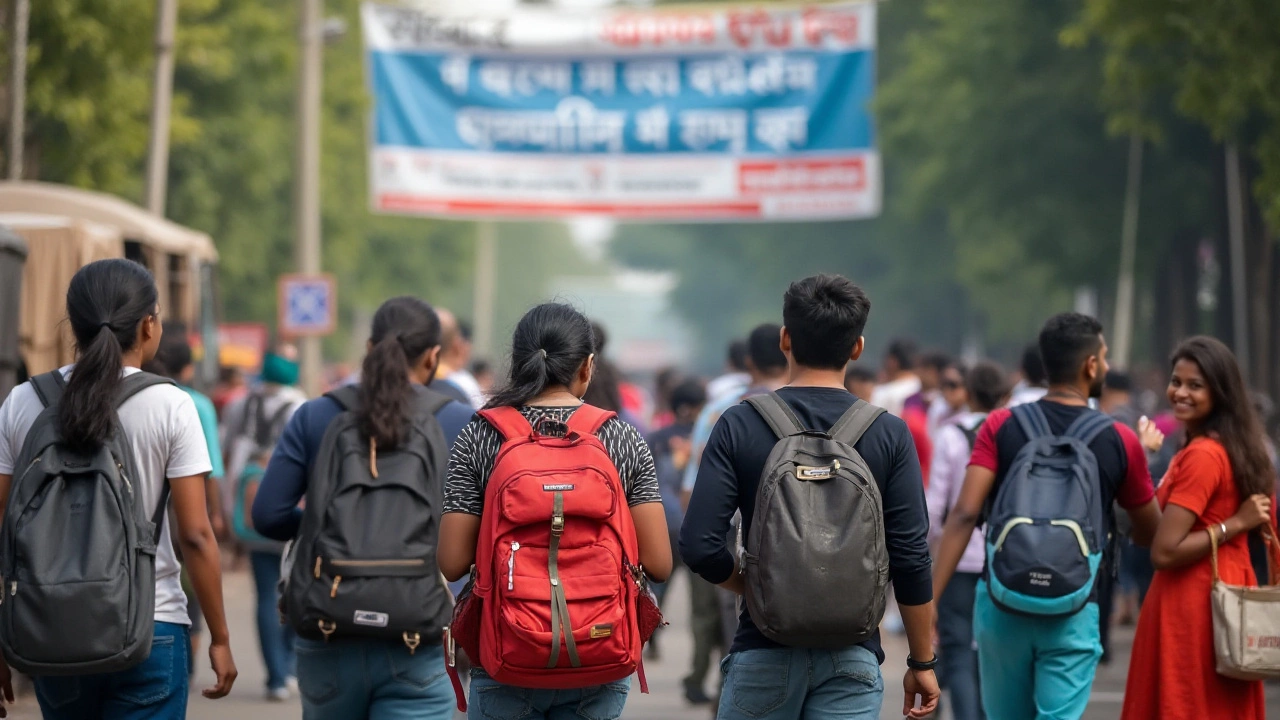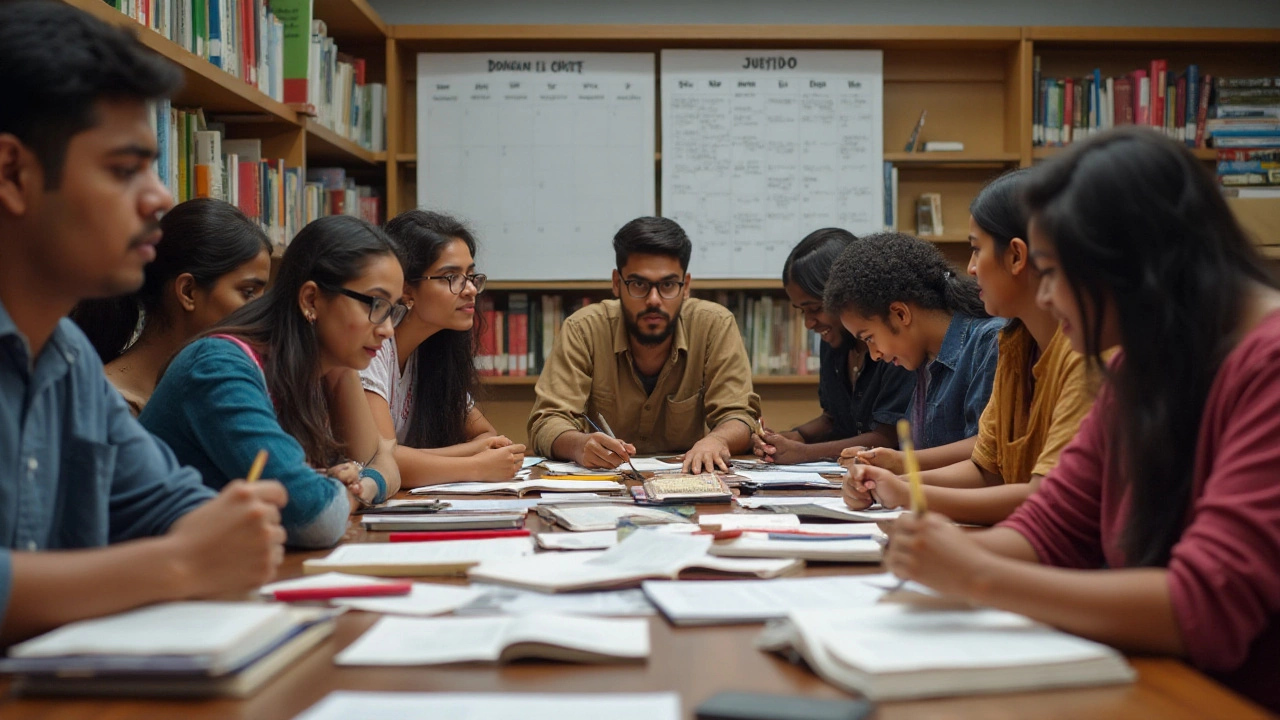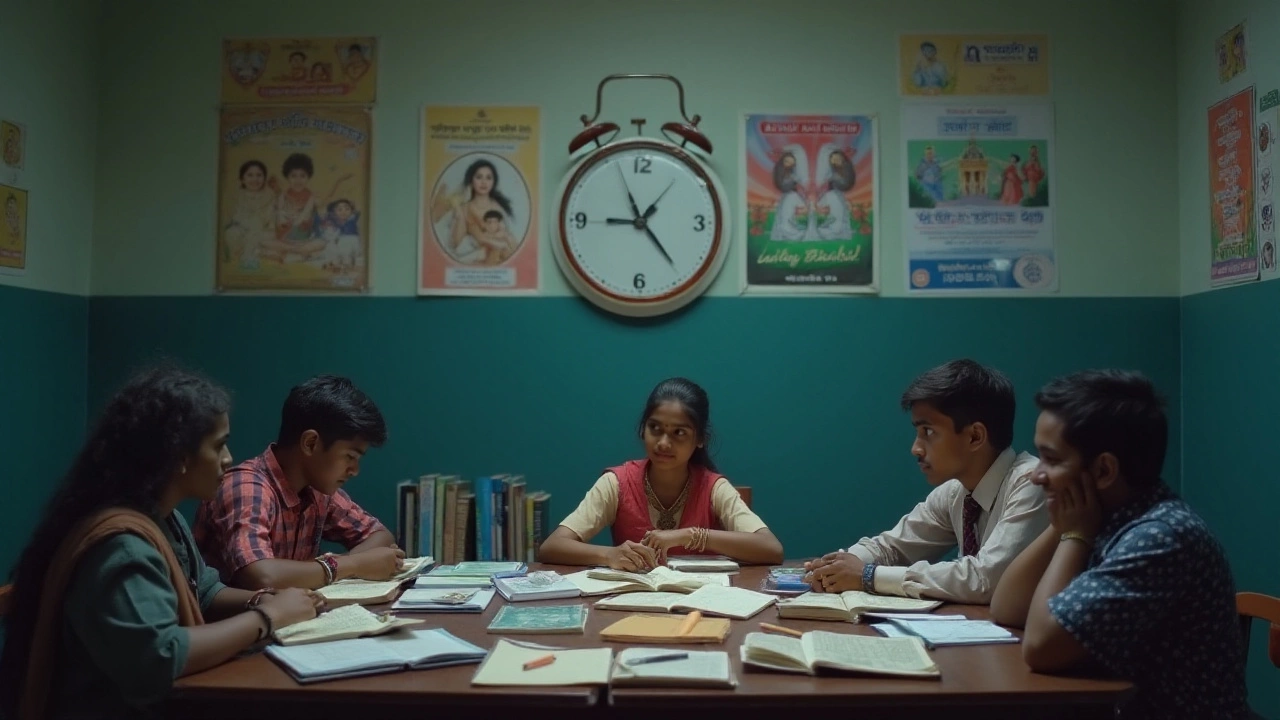Competing in exams is not just about testing one’s knowledge—it’s an intricate dance of strategy, endurance, and mental strength. Around the globe, numerous exams stand out for their sheer intensity and high stakes. They don’t just challenge the intellect but also the resilience of those who dare to take them on. Whether it's the pursuit of academic excellence or the gateway to prestigious careers, these exams are a defining experience for many.
Through this article, we'll explore what makes certain exams exceptionally competitive and how aspirants can prepare to face them. It's not just the curriculum or the exam format, but the sheer number of participants and the narrow margin for error that adds to the challenge. Let's delve into the world of competitive exams and uncover tips to not only survive but thrive under such pressure.
- Understanding Competitive Exams
- Factors that Make an Exam Competitive
- Notable Competitive Exams Around the World
- The Impact of Competitive Exams on Students
- Preparation Tips for Success
- Balancing Stress and Study: Personal Stories
Understanding Competitive Exams
The world of competitive exams is both daunting and exhilarating. They serve as critical gateways to various professional and academic opportunities, influencing the paths of millions globally. Many competitive exams, such as the Indian Civil Services Examination and the Gaokao in China, are renowned for their rigorous nature and the profound impact they have on the lives of participants. These exams aren't just tests of academic prowess; they are assessments of endurance, strategy, and mental fortitude. The preparation process itself often involves mastering complex subjects, time management, and dealing with immense pressure, which sometimes has been likened to a 'rite of passage' for many students and professionals alike.
Competitive exams typically boast a few common features that add to their challenge. First, the number of candidates usually far exceeds the number of available seats or positions, leading to intense competition. This means that even a small mistake can be costly, putting immense pressure on candidates to perform flawlessly. The diversity and breadth of subjects covered often require not only rote memorization but also analytical thinking and problem-solving skills. A quote by Albert Einstein aptly captures the essence of learning necessary for these exams:
"Education is not the learning of facts, but the training of the mind to think."Secondly, the limited time frame for each section of the examination forces candidates to think quickly and efficiently, testing both knowledge and presence of mind. Many exams are also known for their unpredictability, featuring sections that challenge creative and critical thinking abilities without clear, pre-defined answers.
The evolution of competitive exams has led to a global network where certain exams transcend national boundaries. For instance, exams like the SAT and GRE have become standardized tests for entry into universities across continents, influencing education systems worldwide. An interesting aspect of these exams is how they adapt cultural nuances to fit specific educational frameworks while maintaining a standardized testing approach. As education becomes increasingly globalized, many students find themselves preparing for multiple types of competitive exams, each with unique requirements and expectations. This interconnected nature of exams places added importance on understanding global standards, drawing parallels and learning from various education systems to improve personal preparation and strategy.
Participants often employ diverse methods for preparation, ranging from self-study manuals and online courses to intensive coaching classes. The mushrooming of specialized coaching centers is testament to the high stakes involved in these exams. They provide structure, discipline, and motivation, but they also introduce significant financial strain for many families. The pressure to succeed can be overwhelming, sometimes leading to stress and anxiety. As a result, balancing mental health with preparation becomes crucial. It's vital to develop a strategy that includes regular breaks, physical exercises, and psychological support to maintain a healthy mindset throughout the preparation journey. Interestingly, data suggests that candidates who balance hard work with self-care tend to perform better, highlighting a shift in how success in competitive exams is being redefined today.
Factors that Make an Exam Competitive
The intensity of competitive exams often stems from a combination of elements that put candidates to the ultimate test. For one, the enormous number of participants—sometimes in the millions—creates an atmosphere of fierce competition. This staggering number illustrates the sheer demand for limited opportunities such as entry into top-tier universities or elite jobs. Another aspect is the breadth and depth of the syllabus. Many of these exams cover a wide range of subjects, necessitating mastery across diverse fields, making it a herculean task for many.
To add to the challenge, the time constraints imposed during the exams play a significant role. Test takers are required to solve intricate problems or write comprehensive essays within tight time frames, testing not just knowledge but also decision-making skills under pressure. Moreover, the grading system often raises the bar further. With negative marking schemes, precision becomes crucial, forcing candidates to be not only knowledgeable but also calculative.
"Examinations, when managed with intent, prepare students for success in the real world by encouraging a disciplined and deep approach to learning," says Albert Johnson, an education expert.
Another factor turning the heat up in these exams is the unpredictability of questions. The element of surprise ensures that rote learning won't suffice. Instead, it rewards creativity and application of knowledge—pushing students to think outside the box. The level of competitiveness is also heightened by the significant stakes attached to the outcomes. These exams often open doors to prestigious scholarships, reputable institutions, and lucrative careers. The promise of such rewards draws in the brightest minds, making the competition stiffer.
Technology, too, has played its part in evolving these exams into more competitive forms. With computer-adaptive testing systems, the difficulty level adjusts according to the test-taker's ability in real-time, offering a tailored experience that accurately measures one's competence. Preparing for these exams thus needs a multifaceted approach, blending hard work with smart strategies, patience, and emotional resilience.

Notable Competitive Exams Around the World
Globally, competitive exams are benchmarks of academic prowess and entry points to coveted opportunities that promise vibrant careers. Among these, the Indian Institute of Technology Joint Entrance Examination (IIT-JEE) is renowned for its grueling nature, filtering brilliant minds seeking admission into India’s premier engineering institutions. Each year, over a million aspirants gear up to tackle this examination, with success demanding excellence in mathematics, physics, and chemistry. Despite the numerous candidates, only a small fraction rise to the top, making this exam synonymous with rigorous competition and difficulty. This intense rivalry encourages students to develop sharp analytical skills and profound subject knowledge.
Across the Atlantic, the Scholastic Assessment Test (SAT) serves as a gateway to American colleges, assessing students’ readiness for academic life. It evaluates mathematical, verbal, and core reasoning skills. Not only does it test knowledge, but it also measures how well students can apply what they’ve learned in real-world scenarios. The SAT’s distinct role in the U.S. education system makes it a widely recognized and influential exam, with scores often determining one’s academic trajectory.
"In an ever-challenging academic environment, the SAT remains a crucial indicator of a student's potential," remarked an official from the College Board.
On another continent, the Gaokao acts as China’s national college entrance examination, its pressure so immense that it’s often equated to a life-determining event. Students spend years in preparation for this test, which not only assesses their comprehensive knowledge across subjects such as Chinese literature and physics but also their ability to maintain composure under strenuous conditions. The Gaokao’s significance in shaping one’s academic future is unparalleled, often leaving lasting impacts on students’ lives.
In the United Kingdom, the University of Oxford and the University of Cambridge administer their own admission tests to filter potential entrants. For instance, the Law National Aptitude Test (LNAT) aids in assessing candidates for law programs. These tests, though varying in subject focus, demand a high level of critical thinking and subject expertise, with acceptance invariably signaling outstanding academic ability. Such exams are indicative of the educational rigour demanded by prestigious UK universities.
Alternatively, the Graduate Record Examination (GRE) and the Graduate Management Admission Test (GMAT) are popular choices for prospective graduate students aiming for advanced degrees worldwide. The GRE is versatile, catering to a broad range of graduate programs, while the GMAT focuses more on business school applicants. Both exams evaluate quantitative reasoning, verbal reasoning, and analytical writing skills, playing crucial roles in the admissions processes of top-tier institutions globally. The widespread recognition of these exams underlines their authority in the competitive education landscape.
Competitive exams like these are not just tests of knowledge but also of persistence and resilience. They challenge students to push their boundaries and achieve academic greatness. The determination required to excel fosters not just academic skills but also life-long resilience and strategic thinking that benefit candidates well beyond their educational journeys.
The Impact of Competitive Exams on Students
Competitive exams have become an integral part of educational and professional landscapes globally, influencing how students perceive their learning journeys. These tests are designed to gauge a wide range of abilities such as analytical thinking, creativity, problem-solving, and task management. While they aim to highlight capability and potential, the pressure placed on students is significant. Such exams can act as springboards to prestigious institutions or lucrative careers, elevating the stakes involved, and this naturally leads to stress. Students often find themselves grappling not just with the material covered but also the mental pressure of meeting high expectations.
Moreover, the preparation for these exams demands rigorous, often self-imposed, discipline that involves extensive hours of study, practice, and consultation. This often leads to a reduction in leisure time, resulting in a significant lifestyle shift for young aspirants. While some thrive under this intense regimen, enjoying the structured path it provides, others may find it overwhelming. An interesting face of this trend is the increasing availability of coaching centers and online resources dedicated to specific competitive exams, offering tailored approaches to preparation.
"Out of the 1.5 million students appearing for India's Joint Entrance Examination, only less than 2% secure admission into the coveted IITs, reflecting the immense competition," reports the Times of India.
The dynamic of competition impacts mental health as well. It sometimes leads to anxiety and even depression among students who might not meet their expectations or those set by society and family. The fear of failure can sometimes overshadow the genuine pursuit of knowledge. Teachers and parents play a crucial role here, supporting and guiding students to maintain balance, but the societal pressure can still be relentless. Emphasizing a supportive environment where learning is valued over mere results is crucial to combat these negative effects.
In academic research, evidence suggests a correlation between high-stakes testing and psychological stress levels. For instance, numerous studies, including one highlighted by The Lancet, have shown that extended periods of high-pressure studying can significantly affect both physical and mental well-being, resulting in sleep disturbances and health issues. Understanding and addressing these potential ramifications is essential to foster not only informed but also psychologically healthy candidates.
Ultimately, preparing students for these global exams requires an ecosystem that recognizes the importance of mental health alongside academic rigor. Encouraging a balance between preparation and recreation, promoting skills like time management and self-care, and nurturing an intrinsic motivation for learning are steps forward. In today's competitive world, finding this balance is not just helpful—it's necessary for long-term success and sustainability in one's educational and professional pursuits.

Preparation Tips for Success
Embarking on the journey to conquer competitive exams is no small feat, often requiring dedication and a strategic approach. Begin by understanding the exam structure and syllabus. This clarity allows you to map out a study plan that addresses every topic comprehensively. Create a timetable that spreads across months, not just weeks, giving you ample time to tackle each subject thoroughly. It's essential to set realistic daily targets, ensuring a balance between different subjects to maintain diversity in your study routine.
Don't underestimate the power of mock tests and previous year papers. These tools are precious in simulating the exam environment, helping you manage time effectively during the real exam. Analyze each mock test to identify weak areas. Spend additional time shoring up these topics to build a solid foundation in all segments of the curriculum. Joining study groups or discussion forums can also be beneficial. As you exchange ideas with peers, it promotes deeper understanding and aids in clarifying doubts that may have seemed insurmountable alone. According to educational expert John Dabrowski,
"Success in exams is 20% knowledge and 80% strategy. Understanding how to approach the problems is half the battle won."
Next, keeping mental health in check is crucial during the high-pressure months leading up to the exam. Regular rest and recreation play a significant role in maintaining focus and reducing burnout. Incorporate short breaks into your study sessions to refresh your mind. Engaging in activities like meditation or light exercise can enhance memory retention and improve concentration levels. Remember, a healthy mind fuels a successful preparation path.
Hello, technology can be your ally here. Utilize apps and online platforms dedicated to education. Many of these provide insightful materials and practice tests, adding diversity to your study methods. Ensure you periodically evaluate your progress. It helps to have a friendly checkpoint with professionals or mentors who can provide feedback on your preparation strategy. Their outside perspective might highlight areas that need attention that you might have overlooked in the thick of study.
Dealing with Exam Stress
A vital part of preparing for global exams is managing stress effectively. Often, candidates neglect this aspect until it derails their final performance. Keeping a positive mindset is invaluable. Visualization techniques can be used daily—imagine yourself calmly and confidently tackling each section of the exam. It's amazing how visualizing a successful outcome sets a mental blueprint for the actual event. Personal hobbies, whether drawing, music, or even just a walk with your pet, balance the rigorous mental workload, preparing your mind to withstand exam day anxiety with poise.
The lifestyle choices you make now set the stage for your exam day performance. Eating nutritious meals and staying hydrated are paramount. Avoid excessive caffeine or sugary snacks which can spike anxiety levels. Consistent sleep patterns help keep your body clock aligned, ensuring optimal alertness during exam hours. A poor sleep cycle can undo weeks' worth of diligent preparation, so safeguard this aspect religiously. Preparing for prestigious exams is a holistic process, blending study, lifestyle, and mental health into a tapestry of success.
Balancing Stress and Study: Personal Stories
Every year, thousands of students around the globe embark on a journey brimming with challenges as they prepare for the most competitive exams. The pressure to perform can be overwhelming, turning what should be a period of growth into a relentless stress test. This section explores personal stories of individuals who have faced these daunting tests and emerged not just successful, but mentally stronger.
Take Sarah, for example, who was preparing for the Indian Institute of Technology Joint Entrance Examination (IIT JEE), notoriously one of the world's most arduous exams. The stakes were high with millions of applicants and scant spots available. Throughout her preparation, Sarah found herself drowning in stress, fueled by the high expectations set by herself and her family. In an unexpected turn, she discovered yoga and meditation, which revolutionized her approach to stress. Though initially skeptical, these practices taught her the significance of a disciplined relaxation routine that complemented her study sessions beautifully. As she recounts, "Yoga was my anchor; it kept me grounded when the world felt too chaotic."
Another fascinating account is from James, who aimed to conquer the United States Medical Licensing Examination (USMLE). With rigorous content and time constraints, the test is designed to challenge potential doctors thoroughly. James, during his endless nights of study, realized the importance of balance. Adopting the Pomodoro Technique, he managed to maintain productivity without burnout, working in blocks of focused study followed by breaks. His social life, which he feared relinquishing, remained intact, allowing moments of joy amidst rigorous prep. "Keeping your sanity is just as important as acing the exam," says James, sharing the indispensable lesson he learned.
It's crucial to acknowledge that while different techniques work for different individuals, the shared thread is understanding one's limits and needs. Stress can be a sly, unseen companion that hovers over every exam preparation plan, demanding candidates to push themselves often beyond their comfort zones. A prominent study conducted by the American Psychological Association showed that nearly 77% of students reported feeling stressed regularly due to academics. Managing this stress is integral not just to academic success but also to maintaining one's health.
Through these narratives, one thing becomes clear: balance is key. Whether through exercise, strategic planning, or simply indulging in a hobby, finding an outlet for stress is vital. For many, the journey to acing a global exam becomes a profound experience of self-discovery. The confidence and resilience gained from navigating this path can last well beyond the exam day.
As we navigate these tough yet promising paths, it pays to remember the wisdom shared by stalwarts in the field: "Success is not the key to happiness. Happiness is the key to success. If you love what you are doing, you will be successful."


